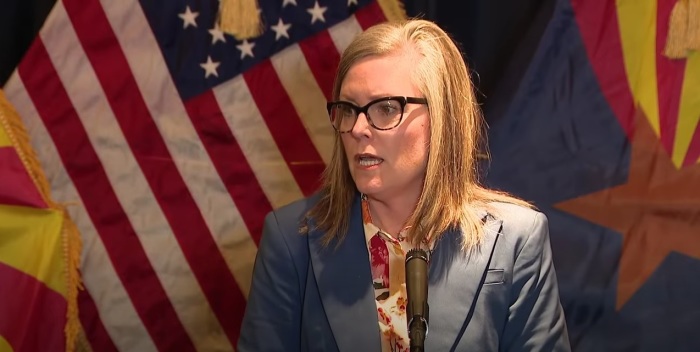Arizona Gov. Katie Hobbs vetoes bill requiring insurance companies to cover detransitions

Arizona Gov. Katie Hobbs has vetoed a bill that would require health insurance companies to cover detransition procedures of individuals who underwent gender transition procedures and are now seeking to align their physical appearance with their biological sex again.
Hobbs sent a letter Tuesday to Arizona Senate President Warren Petersen, a Republican, informing him that she was vetoing Senate Bill 1511 but didn't elaborate much on her reasoning behind the veto. She only indicated that she viewed the bill as "unnecessary," expressing concern that it "would create a privacy risk for patients."
Senate Bill 1511 was approved by the Republican-controlled Arizona Senate in a 16-12 vote and passed by the Republican-controlled Arizona House of Representatives in a 31-29 vote.
"A physician, health care institution or other person or entity that is licensed or otherwise authorized to furnish health care services in this state and that performs gender transition procedures must agree to provide or pay for the performance of gender detransition procedures," the bill states.
The bill would have prohibited health insurance providers from denying coverage for "gender detransition procedures." If passed, the measure would have required health insurance providers to compile reports about the number of detransition claims that included the "age and sex of the individual who received the gender detransition procedure" as well as the date of the individual's gender transition procedure and the location in the state where the detransition procedure took place.
The proposed legislation forbade the inclusion of personally identifying information about detransitioners in the report.
Hobbs' veto of the measure reflects the politically polarizing nature of the debate about surgical and hormonal gender transition interventions, with Democrats generally supporting such procedures and Republicans opposing them. All Republicans in both chambers of the state legislature voted in favor of the proposal, while not a single Democrat voted for it.
The plight of detransitioners, individuals who once identified as a member of the opposite sex and underwent some type of gender transition procedure only to regret those procedures later on and see their gender dysphoria subside, has gained national attention.
One of the most prominent detransitioners who has emerged as a national voice against gender transition surgeries is Chloe Cole.
Cole, now an adult, filed a lawsuit last year against the medical professionals who treated her as she experienced gender dysphoria as a teenager.
A notice of intent to sue filed earlier in the year detailed how Cole was "advised that the distress she experienced because of her gender dysphoria would resolve as she transitioned," only to discover that her "distress always came back worse" following the "initial relief" that occurred after "each phase of transition."
Cole had a double mastectomy performed on her at the age of 15. The notice of intent to sue alleged that the removal of the healthy breast tissue caused her to experience suicidal thoughts and a deteriorating state of mental health.
In an appearance at the Conservative Political Action Conference last year, Cole elaborated on the struggles she has experienced as a detransitioner seeking to reverse or mitigate the effects of the life-altering procedures performed on her.
"I've reached out to the team of medical professionals who helped me transition, and I haven't gotten any help with my detransition," she said. "I've even tried to figure out how to go through the motions all by myself."
Lamenting that California, where she resides, does not provide health insurance coverage for detransition procedures, Cole explained "I'm having a lot of complications from the blockers, the cross-sex hormones and the surgery and I haven't gotten help with any of those." She stressed that there are "no standards of care for people like me."
Cole also obtained puberty blockers and cross-sex hormones, which are frequently prescribed to youth with gender dysphoria. As outlined by the American College of Pediatricians, puberty blockers can cause "osteoporosis, mood disorders, seizures, cognitive impairment" and sterility, while cross-sex hormones can lead trans-identified individuals to "an increased risk of heart attacks, stroke, diabetes, blood clots and cancers across their lifespan."
Concerns about the long-term impact of gender transition procedures, illustrated in part by Cole's experience, have led several states, including Arizona, to implement measures prohibiting the performance of some or all of the life-altering procedures on minors. Arizona's ban only applied to gender transition surgeries, not puberty blockers or cross-sex hormones.
Hobbs issued an executive order shortly after taking office last year that seeks to ensure "access to medically necessary gender-affirming healthcare" and reversed a ban prohibiting the health insurance plan provided to state employees from excluding gender transition procedures.
Ryan Foley is a reporter for The Christian Post. He can be reached at: ryan.foley@christianpost.com





























